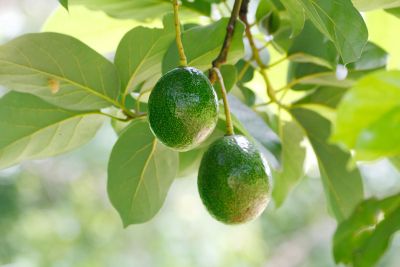Some Fruit Drop in Avocado Trees is Normal
An avocado tree will typically drop some of its unripe fruit in the summer simply because it has grown more fruit than the tree can reasonably support. This is normal and allows your tree to better support and develop the remaining fruit. Regular thinning of fruit can often help alleviate this. The fruit that drops may be very small, no bigger than a pea, or a little larger, like a walnut. You may see a thin line on the stem where the fruit detaches. This can be a sign that it is normal fruit drop and not caused by a disease or pest.
Stress Can Cause Avocado Fruit Drop
Although some fruit drop is normal, there can be issues causing your tree to lose more than is typical. One cause is that of stress. Water stress, for instance, can cause a tree to lose fruit prematurely. Both under and overwatering cause this. Your avocado tree needs soil that drains well and adequate watering, especially during hot weather. Avocado feeder roots lie close to the soil, so stress or damage to them causes unwanted fruit drop. To avoid this, let the leaves of the tree that have fallen stay on the ground and provide a protective barrier. Alternatively, add mulch under your avocado trees. There is some evidence, although not conclusive, that too much nitrogen fertilizer can stress an avocado tree and cause fruit drop. Avoid using fertilizer, or at least limit nitrogen, between the months of April through June.
When Avocado Tree Drops Fruit, Look for Pests
An infestation of avocado thrips is the most likely pest culprit causing avocado fruit drop, but mites can also be an issue. If you have persea mites infesting your tree, fruit drop will be the last symptom of an extreme problem. First, you will see spots on the undersides of leaves, silvery webbing on leaves, and then leaf drop. Avocado thrips are a more likely and subtle cause of fruit drop. Look for scarring on new fruits, close to the stem end (these will eventually be all over). The thrips feed on the stem, which causes the damage and then drop. Once you see signs of thrips, unfortunately, the damage to affected fruit is already done. To manage thrips the following year, you can use an appropriate spray during the setting of the fruit. Check with a local nursery or your extension office for advice on what to use and how to spray. Avocado thrips are a fairly new pest in the U.S. so control measures are not yet standardized.
